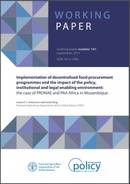Publicaciones
The development and implementation of an efficient institutional food procurement programme (IFPP)—which aims to link smallholder producers to institutional markets and promote development of food supply systems—is not a simple or straightforward task. It requires a series of conditions that must be coordinated and matched together. These conditions depend on—but go far beyond—governmental will and the availability of demand. The central idea of this paper is that the policy and legal frameworks within which an IFPP is designed and the institutional environment in which it is implemented influence and can have a key impact on its successful implementation.
El objetivo del estudio es identificar y analizar el abordaje de buenas prácticas y programas de éxito de EAN en el marco de los PAEs que puedan ser ampliados/replicados en otros países.
Improving child nutrition is critical to human development and to the realization of human rights, as stated by the Second International Conference on Nutrition (ICN2), the Sustainable Development Goals(SDGs), the Zero Hunger Challenge, and the UN Decade of Action on Nutrition 2016-2025.
This report aims to analyse how food systems influence diets and nutrition. It offers three significant additions to previous frameworks. First, it emphasizes the role of diets as a core link between food systems and their health and nutrition outcomes. Second, it highlights the central role of the food environment in facilitating healthy and sustainable consumer food choices. Third, it takes into account the impacts of agriculture and food systems on sustainability in its three dimensions (economic, social and environmental).
The Purchase from Africans for Africa (PAA Africa) programme executed a pilot initiative for local food purchases, funded by the Brazilian government and the UK Department for International Development (DFID) in collaboration with the Food and Agriculture Organization of the United Nations (FAO) and the World Food Programme (WFP). Implemented in five African countries (Ethiopia, Malawi, Mozambique, Niger and Senegal), the programme fostered a multisectoral approach.
This document aims to capitalise on the results of the pilot experience and qualitatively evaluate its contributions to the consolidation of an institutional market strategy for family farming in Mozambique.





